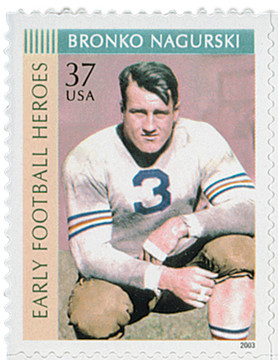
U.S. #3808-11
37¢ Early Football Heroes
Issue Date: August 8, 2003
City: South Bend, IN
Printed By: Avery Dennison
Printing Method: Photogravure
Perforations: Serpentine Die Cut 11.5 x 11.75
Quantity: 70,000,000
Color: Multicolored
This set of four honors early American football heroes.
Bronko Nagurski
"Defense him? There's only one way to defense him - shoot him before he leaves the dressing room!" That is what Giants' coach Steve Owen had to say about Bronko Nagurski back in the 1930s. Bronislaw "Bronko" Nagurski (1908-90) was big, fast, and possessed legendary strength. It was not unusual for him to drag two men several yards until a third came to help bring him down.
Ernest Nevers
In 1925, Ernest Nevers (1903-76) was on crutches with broken ankles until two days before the Rose Bowl. He played the entire 60 minutes against Notre Dame on ankles tightly wrapped with pieces of an inner tube. As player-coach of the Chicago Cardinals in 1929, Nevers scored all 40 of the Cardinals' points. Bears' coach George Halas said it best: ÒBears 6, Nevers 40."
Walter Camp
U.S. football began as a soccer-like game in the mid-19th century. Running with the ball and tackling, as in English rugby, was introduced later. The father of American football, Walter Chauncey Camp (1859-1925) developed rules and techniques that set the American game apart from British rugby. He devised guidelines that reformed the game, making it both safer and more exciting.
Red Grange
Harold "Red" Grange (1903-1991) became known as the Galloping Ghost in 1924 when he scored five touchdowns against Michigan, four in the first 12 minutes of play. Damon Runyan wrote that Grange was "three or four men and a horse rolled into one...." Red Grange remains one of football's greatest running backs.
First U.S. Stamp With Scrambled Indicia
On September 18, 1997, the USPS issued the U.S. Air Force stamp, the first U.S. stamp to have a hidden image using Scrambled Indicia.
Over the years, the USPS had always sought ways to combat counterfeiting, with grills being one of the earliest examples. As technologies changed, they found new, more advanced ways to do this, including microprinting and tagging. Then in 1997, they introduced Scrambled Indicia.
Scrambled Indicia is a pre-press process invented by Graphic Security Systems Corporation. According to the company, it “scrambles, distorts, intertwines, overlaps, or otherwise manipulates images making encoded information on them unreadable by the naked eye, and non-copyable by current color copiers and digital scanners.” These images could then be viewed using a special decoder. In addition to thwarting counterfeiting, the USPS also hoped this interesting new technology could help arouse interest among collectors and inspire new ones.
Between 1997 and 2004 the USPS produced more than 40 stamps with Scrambled Indicia:
Click here to get your own decoder to see these neat hidden images in person.










